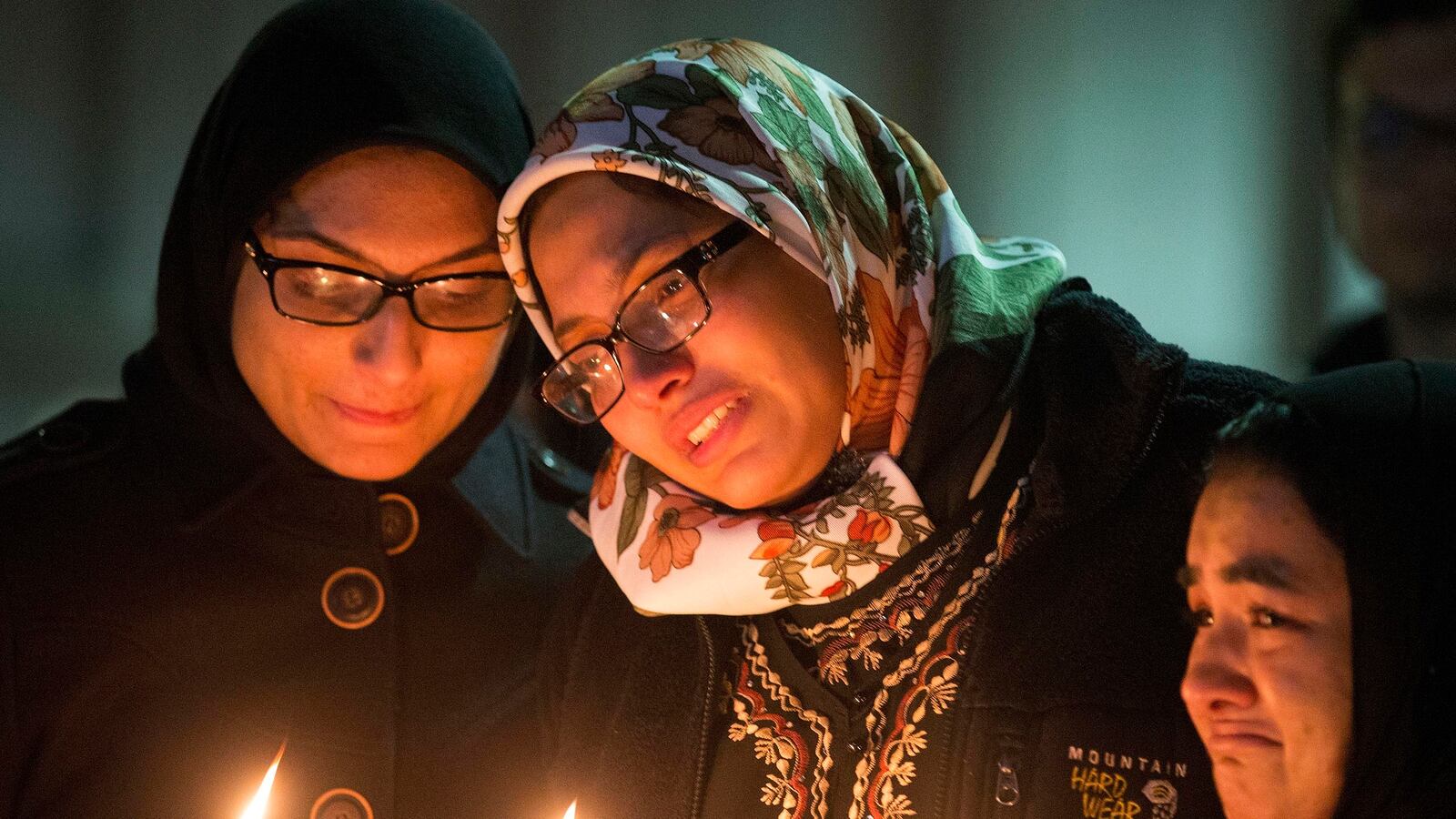Whether the triple homicide in North Carolina was triggered by a parking dispute or by a hatred of Muslims or both, this is certain:
The murder weapon was a handgun.
Without the gun, there would have been no triple funeral on Thursday for 23-year-old Deah Shaddy Barakat and 21-year-old Yusor Mohammad and 19-year-old Razan Mohammad Abu-Salha.
And the exact nature of Craig Hicks’s fury toward these three magnificent human beings would be of no great consequence.
He would have just kept fuming.
The weapon that changed everything was almost certainly the one that Hicks was licensed to carry thanks to the prevailing reading of the Second Amendment.
As tabulated by the Violence Policy Center, this was the 29th shooting involving three or more victims by a concealed handgun permit holder since mid-2007.

Less than a month ago, Hicks posted a photo of his handgun on Facebook, set in its holster on a digital scale along with a reload.
A Facebook photo Hicks posted last Christmas Eve of himself in a suit carried the comment “same ugly, stupid, fat person with less hair now.” But he was clearly delighted by the January 20th picture of the featherweight gun.
“Yes, that is 1 pound 5.1 ounces for my loaded 38 revolver, its holster, and five extra rounds in a speedloader,” he wrote.
The negligible weight made it easy for Hicks to carry the weapon, and his neighbors reported seeing it on his belt as he sputtered and glowered about noise and about people parking cars in unassigned spaces in what he called “my parking lot” at the condominium complex where he and his wife resided.
Ten days before he posted the gun photo, Hicks announced on Facebook: “It is official, I am a grumpy old man.”
“I now am sure of this, as when I saw a couple having sex in their vehicle in my parking lot a little bit ago instead of just ignoring it I called Chapel Hills finest on them,” he wrote.
The Chapel Hill police confirm that Hicks did indeed telephone them, but the couple was gone by the time they responded. Police say that Hicks also called 911 in 2013 to report an assault in “my parking lot.” The parties involved were able to resolve the dispute without the responding cops needing to take action.
Hicks could hardly call 911 about people using unassigned spaces in the lot, though he did repeatedly have cars towed.
And then there was noise, not blasting music that might justify him seeking police intervention but the muffled sounds of people living their lives behind closed doors.
A 25-year-old neighbor named Samantha Maness told Raleigh’s News & Observer that Hicks complained of the noise after she and some friends enjoyed a few sociable hours in her apartment.
“We were playing Cards Against Humanity, not being very loud at all,” Maness remembered.
Maness reported, “He was aggressive when it came to things like parking and noise. I don’t know if it was every day, but it was very consistent that I know of over the past year and a half.”
She added, “He was angry any time I saw him.”
She described Hicks as being particularly peeved by unfamiliar cars but liable to vent his anger on neighbors of all persuasions.
“He had equal-opportunity anger toward a lot of the residents here,” Maness told the newspaper.
Maness recalled that the neighbors even held a meeting in the community center last year to discuss what they might do about him. No immediate answer presented itself, and Hicks continued as before.
All of the many people who had been a target of Hicks’s equal-opportunity anger would have had cause to worry when he posted that photo of his lightweight gun and more so when they saw it on his belt.
Not that they could have done anything as long as Hicks did not draw the weapon and threaten them. North Carolina law accords the gun owner the presumptive right to carry it, and Hicks apparently had neither a criminal record nor a psychiatric history.
Relatives of the murder victims are convinced that Hicks targeted the three because they were Muslim. Hicks was what he described as a “devout atheist,” and he may indeed have been bothered by the headscarves the two women wore in keeping with their faith. He also may not have been immune to all the recent talk in the media about Muslim extremists.
Hicks termed himself a “gun toting liberal” on Facebook, the liberal part most apparent in his vocal support of gay rights. But there was also the gun-toting part, and his ex-wife reports that he once went through a phase when he was obsessed with Falling Down, a movie about a man who snaps and goes on a shooting spree.
Maybe the relatives of the victims are right. Maybe some unvoiced hatred of Muslims did cause Hicks to snap and turn murderous with the three as he did not with Maness and the many other neighbors who roused his ire.
Maybe the Chapel Hill police were too narrow in their preliminary assessment of the killings as the result of “an ongoing neighbor dispute over parking.”
But the relatives would be wrong to suggest that the media initially paid less attention to the killings because the victims were Muslim.
Last month, the media paid scant attention when a Biltmore man murdered two non-Muslim neighbors as the result of what police there described as “an ongoing parking dispute.”
The common denominator between the two cases was a gun.
When Hicks was booked for murder, he had also been fingerprinted not so long ago.
That was when he applied for a permit to carry a pistol.
And of course he got it.





